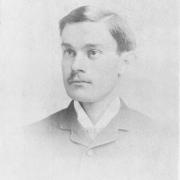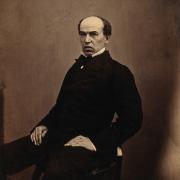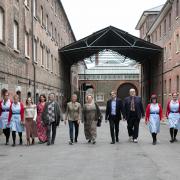Embarking on a second century of looking after society's most vulnerable young people, The Caldecott Foundation at Smeeth has come a long way since its early beginnings as a nursery school for the children of match factory girls
A century of care in Kent
Embarking on a second century of looking after society’s most vulnerable young people, The Caldecott Foundation at Smeeth has come a long way since its early beginnings as a nursery school for the children of match factory girls
The dawning of 2011 marks the centenary of one of the most inspiring charities in Kent, which has rebuilt the lives of thousands of young victims of cruelty and neglect.
The Caldecott Foundation, based at Smeeth, near Ashford, cares for up to 50 youngsters aged from five to 16 in warm and welcoming residential homes, with its own school, therapy centre and fostering service. The facilities are bright and modern, the staff highly trained, the homes and gardens impeccably tended.
It’s all quite a contrast to the modest building in St Pancras, London where Leila Rendel, a 28-year-old suffragette and social care pioneer, first established a nursery school for the children of local match factory girls.
Leila came from a generation of liberal, upper-class benefactors who devoted their lives to the plight of the poor. While conditions in the East End had improved since the days of Dickens and Dr Barnardo, many children were still either locked in at home or left to roam the streets while their mothers and fathers went out to work.
Leila and her friend Phyllis Potter spent their evenings begging donations from friends and family, including Leila’s grandfather, Sir Alexander Rendel, one of the great Victorian civil engineers.
Leila chose the name ‘Caldecott’ for her nursery in honour of Ralph Caldecott, the Victorian illustrator of children’s books and the J.K.Rowling of his day. A frieze of his pictures decorated the nursery walls.
The First World War eventually forced the nursery out of the capital and in 1917 Leila, Phyllis, helpers and children decamped to Charlton Court, a rambling Jacobean manor at East Sutton, near Maidstone.
Leila wrote at the time: “Salaries were a pittance, and hours of work undefined, but we were a young, vocational group of workers, and the sense of adventure compensated for what we lacked in material wellbeing.”
Increasingly, Caldecott was becoming a safe haven, not just for poor London children, but also youngsters whose lives had been torn apart by death, sickness and divorce in their families.
Their experiences sometimes resulted in outbursts of temper and destructive behaviour, and it marked a turning point in the role that Caldecott was expected to fulfil: caring for children considered “maladjusted”, but whose rage was a manifestation of searingly painful events at home.
A brief relocation to a large country house in Hertfordshire ended with a return to Kent in 1931, when Caldecott moved into Mote House, Maidstone, which became home to 85 babies, children and teenagers.
Leila and her colleagues were revolutionary in their approach to troubled children, and they built their confidence by encouraging them to put on plays, read at chapel services and enjoy brisk sessions of PE.
Their ground-breaking work came to the attention of the Home Office, and when war broke out again, Caldecott was re-designated as an Approved School to help cope with the rising tide of juvenile delinquency.
Bombing raids forced Caldecott to re-locate again, this time to Dorset. To her ever-growing band of the poor and neglected, Leila also welcomed 15 Jewish children from Eastern Europe, whose families had fled the Nazis.
The end of the war saw Caldecott return to Kent, this time to magnificent Mersham-le-Hatch near Ashford, the ancestral home of the Brabourne family, although its stately interior had become dilapidated following wartime use as a military hospital.
The Brabournes became devoted supporters - Lord Brabourne was chairman of governors for more than 40 years, serving alongside his wife Countess Mountbatten, while their daughter Amanda Ellingworth was also in the chair until last year.
By 1967, Leila realised she needed to hand over to someone younger, with the energy and drive to cope in a new era of child protection laws and intensifying demands for residential places. She handed the baton to a new ‘house father’, James King, and his wife Tessa.
For Leila, it was the end of a lifetime dedicated to children who had endured the worst possible start in life. She died in 1969, and a memorial service at St Martin’s-in-the-Fields, London attracted the leading figures in social welfare.
For the Kings, however, it was the beginning of a turbulent period. The rupture with the past, and the liberal philosophy of the Swinging Sixties had influenced some members of staff, whose lack of discipline resulted in increasing insecurity among the children.
But gradually they restored stability, and over the next 25 years oversaw an increasingly successful Caldecott, with 17 children winning university places and others going onto distinguished careers, ranging from teaching to law.
In 2002, Caldecott made its final move into an imposing Victorian house in Smeeth, and an �8m appeal resulted in the building of seven residential homes in the grounds, and a school.
Today, Caldecott is trusted by social care professionals throughout the country to provide the best care in the most modern facilities. As Angus Fraser, chairman of trustees, puts it: “We are committed and determined to continuous improvement to ensure our children can look forward to better lives.”
That sentiment would certainly chime with Leila Rendel, who would be proud that her lifetime of dedication has continued, and that Caldecott is now embarking on a second century of looking after society’s most vulnerable young people.
CENTENARY APPEAL
The centenary of The Caldecott Foundation is being marked with a series of high-profile events, including a Thanksgiving service at Canterbury Cathedral, a 1911-themed summer garden party at Doddington Place, and a charity art auction.
A �750,000 centenary appeal has been launched to build new facilities at Smeeth, including a vocational training centre where older children can learn workplace skills such as car mechanics and hair and beauty.


























